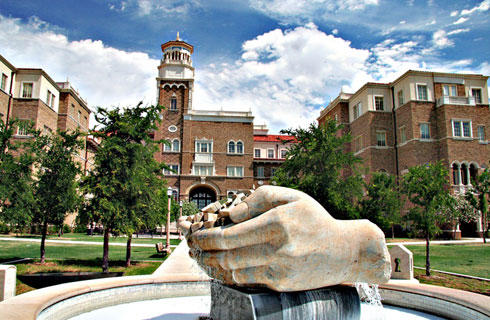- IDP China>
- 课程库>
- 自然科学>
- 生物与生物医学科学>
- 遗传学>
- Doctor of Philosophy in Molecular Genetics - Cellular and Molecular Structure and Function
分子遗传学哲学博士-细胞和分子的结构与功能
Doctor of Philosophy in Molecular Genetics - Cellular and Molecular Structure and Function

学历文凭
Ph.D.

专业院系
Department of Molecular Genetics

开学时间

课程时长

课程学费

国际学生入学条件
IDP—雅思考试联合主办方

雅思考试总分
7.0
- 雅思总分:7
- 托福网考总分:93
- 托福笔试总分:580
- 其他语言考试:Certificate of Proficiency in English (COPE) - Required score - 76 (with at least 22 in each component and 32 in the writing component)
CRICOS代码:
申请截止日期: 请与IDP联系 以获取详细信息。
课程简介
The Department of Molecular Genetics is administered from the Medical Sciences Building and has nearly 100 faculty members whose labs are located within the Medical Science Building, the Best Institute, the Donnelly Centre for Cellular and Biomolecular Research, the FitzGerald Building, the Hospital for Sick Children, Mount Sinai Hospital, the Ontario Institute for Cancer Research, and Princess Margaret Hospital.The Master of Science and Doctor of Philosophy programs in Molecular Genetics offer research training in a broad range of genetic systems from bacteria and viruses to humans. Research projects include DNA repair, recombination and segregation, transcription, RNA splicing and catalysis, regulation of gene expression, signal transduction, interactions of host cells with bacteria and viruses, developmental genetics of simple organisms (worms and fruit flies) as well as complex organisms (mice), molecular neurobiology, molecular immunology, cancer biology and virology, structural biology, and human genetics and gene therapy.Our research interests in the area of Cellular and Molecular Structure and Function range from computational protein folding to stem cell biology. Despite the breadth, there are a number of themes that can be identified, all of which are centred on understanding fundamental mechanisms. Several labs are focussed on neuronal development and neuronal tissue function, for example, work that includes the study of neuronal stem cell generation, axon guidance mechanisms and the molecular basis for neural network formation. Central to these efforts is the study of stem cells and the use of a number of different animal models. Cutting-edge techniques involving laser optics and optogenetics are leveraged to study higher-order functions such as learning, memory and locomotion. Stem cells and animal models, including the zebra fish, are also being used to study development and disease in other systems and tissues including the heart and kidney. Collectively, the advances emerging from these efforts are expected to contribute to novel approaches to treating neural and heart tissue damage, brain cancers in children and Alzheimer's disease in the elderly to name just a few. Genome stability through successive cell divisions is central to the maintenance of normal cellular function. Not surprisingly, DNA damage and the gain or loss of chromosomes or portions of them are hallmarks of cancer. Several MoGen labs are working to understand DNA repair mechanisms and the processes that ensure proper chromosome replication and segregation. In one collaborative effort, functional genomics, microscopy and mass-spectrometry are being used to study centrosome biogenesis, an important component in the regulation of cell division. In another collaboration, cell-based approaches and x-ray crystallography are utilized to determine how DNA repair enzymes are recruited to double-strand breaks.
相关申请
 预科
预科 奖学金
奖学金 实习机会
实习机会 在校学习
在校学习 跨境学习
跨境学习 校园授课-线上开始
校园授课-线上开始 在线/远程学习
在线/远程学习
开学时间&学费
学费信息仅供参考,请与IDP联系以获取详细信息
| 开学时间 | 时长 | 学费 | 地点 |
|---|
学校排名

世界排名21
数据源:
泰晤士高等教育世界大学排名
关于多伦多大学

多伦多大学(University of Toronto),始建于1827年,坐落在加拿大的第一大城市多伦多,是加拿大的一所顶尖学府,亦为加拿大传统四大校之一。安大略省政府及议会环绕在市中心的女王公园四周,现已发展成为一所“一主两翼”格局的世界知名研究性大学--坐落于市中心的圣乔治校区(St. George),历史最为悠久,与3个更小的大学联盟并有享有七大学院制,与十座教学医院有着密切关系;东西向延伸至世嘉堡与密西沙加,UTSC有着乡村般的风光,风景别致,搭乘TTC一小时路程;UTM则是在西边,有校车往返。在学术及研究方面,多伦多大学一直处于领先地位。其经费、捐款、国家教授奖项、研究出版规模和藏书量皆为加拿大之首。多伦多大学出版社在加拿大乃至全北美影响深远。实行独立书院制的学府,荣获诺贝尔奖的教授人数是加拿大最多的。维多利亚学院是其最富有的学院之一 提供更多奖学金和相关设施。多伦多大学亦为美国大学协会中仅有的两所非美国学府之一。多伦多大学每年发表的科研论文数量在北美仅次于哈佛大学,引用数量位居世界前五。主要贡献:干细胞及胰岛素的发现,电子起搏器、多点触摸技术、电子显微镜、抗荷服的发明和发展,NP完全理论,以及发现首个经核证的黑洞。
本校相关课程
其他相关课程

遗传学理学学士
 韦仕敦大学
韦仕敦大学学历文凭
Bachelor Degree
开学日期
课程费用总额


生物学学士-遗传学,基因组学和生物信息学
 肯塔基大学
肯塔基大学泰晤士高等教育世界大学排名:483
学历文凭
Bachelor Degree
开学日期
课程费用总额


Bachelor of Arts in Genetics
 罗格斯大学新布朗斯维克分校
罗格斯大学新布朗斯维克分校学历文凭
Bachelor Degree
开学日期
课程费用总额


兽医学遗传学博士
 北卡罗莱纳州立大学罗利分校
北卡罗莱纳州立大学罗利分校学历文凭
Ph.D.
开学日期
课程费用总额


遗传学,基因组学和生物技术学士学位
 杨百翰大学
杨百翰大学学历文凭
Bachelor Degree
开学日期
课程费用总额


生物学理学学士-遗传学和基因组学
 犹他大学 - Shorelight
犹他大学 - Shorelight学历文凭
Bachelor Degree
开学日期
课程费用总额
















